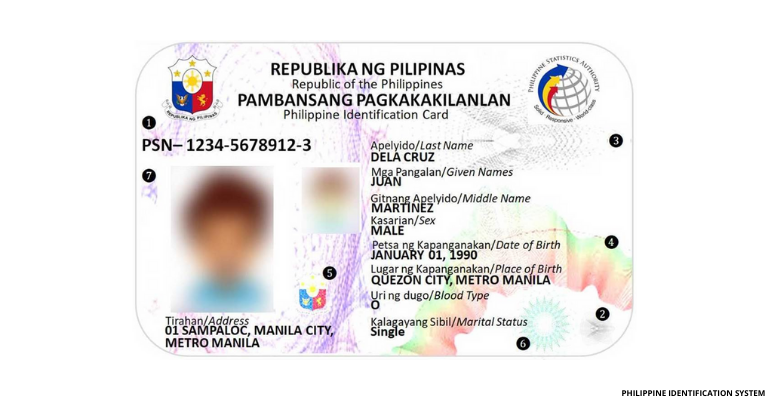In an effort to create a universal identification card in the Philippines, Republic Act 11055 or the PhilSys Act was signed into law in August 2018. Under PhilSys Act, a Filipino Identification System has to be established and monitored by the Philippine Statistics Authority (PSA).
It was created to provide both Filipino and foreign residents a single and unified proof of identity for much more efficient and faster transactions.
The National ID can be used for applying various services and eligibility requirements both in public and private transactions. It is also intended as access to social welfare and benefits granted by the government, and act as a deterrent against unlawful acts.
The Philippine Identification System has three components:
PhilSys Number (PSN) – It is a randomly-generated, unique, and permanent identification number that will be assigned to each person (citizen or foreign) upon birth or registration via PSA. No person can have more than one PSN and shall not be pre-determined or pre-assigned to any person and cannot be chosen.
PhilSys Registry – It is a database that stores the PSN, including all registration records, history, and other related information.
Philippine National ID (PhilID) – It is a non-transferable card that is to be issued to all eligible persons registered in PhilSys per the guidelines issued by the PSA.
Who are eligible for the National ID Registration?
As stated in Republic Act 11055, all Filipino citizens, and resident aliens (foreigners) can apply for the PhilID. Filipinos working abroad and dual citizens can also apply.
Personal Information Needed
The PhilID will gather the following personal information:
- Demographic Data
- Full name;
- Sex;
- Date of Birth;
- Place of Birth;
- Blood Type;
- Address;
- Filipino or Resident Alien;
- Marital Status (optional);
- Mobile Number (optional); and
- Email Address (optional)
- Biometrics Information
- Front Facing Photograph
- Full set of fingerprints
- Iris scan; and
- Other identifiable features (only if necessary)
PhilSys Act and Data Privacy Act of 2012 both enforce strict rules on the safekeeping of the data. To further ensure data security, the government will conduct a Privacy Impact Assessment (PIA) to list down any potential cracks in the system through the Vulnerability Assessment and Penetration Testing (VAPT) stage.
Also Read
PSA: National ID system registration starts on October 12
NEDA: National ID Online Registration to start on April 30
How to Register for Philippine National ID Online
Where to register for the National ID?
All eligible citizens can personally register via accredited registration centres, including:
- PSA Regional and Provincial Offices;
- Local Civil Registry Offices (LCROs);
- Government Service Insurance Systems (GSIS);
- Social Security System (SSS);
- Philippine Health Insurance Corporation (PhilHealth);
- Home Development Mutual Fund (HDMF);
- Commission on Elections (COMELEC);
- Philippine Post Corporation (PHLPost); and
- Other government agencies and GOCCs assigned by the PSA.
For overseas Filipino citizens, the registration can be made in the nearest Philippine Embassy or Philippine Foreign Service post, or other registration centres assigned by the Department of Foreign Affairs (DFA) in coordination with PSA.
The application process must be done personally, disallowing representatives on behalf of another person.
However, special arrangements will be allowed for the following registrants, including:
- Minors;
- Senior Citizens;
- Persons with a disability;
- Indigenous Persons; and
- Persons in Institutional Households.
Moreover, PSA will also cater to mobile registrations to serve citizens and residents from far-flung areas.
National ID Registration Fee
The registration and application for the Philippine ID are entirely FREE to all eligible registrants.
National ID Registration Requirements
The primary requirement in applying for the PhilID is any government-issued ID containing the applicant’s full name, photo, and signature or thumb mark, such as the following:
- Original copy of Birth Certificate issued by PSA (formerly NSO);
- Valid Philippine Passport;
- Unified Multi-purpose Identification (UMID) card issued by the SSS or GSIS;
- Any other equivalent document approved by PSA such as Marriage Certificate, if married;
- Driver’s License;
- NBI Clearance
Note that all IDs presented must be original and unexpired. Photocopies of valid IDs are not applicable.
How to Apply?
- Submit a duly accomplished PhilSys Registration Form (Form No. 1) together with your requirements at your chosen registration center.
- Register your biometric information. These are your front-facing photograph (photo capture), fingerprints, your iris scan, and your demographic information.
- If the applicant’s biometric and demographic information is found and proven to be unique, a PhilSys Number (PSN) will be generated. If not, further verification will be needed.
- The ID will be issued once the PSN is given, and the application is completed.
Purpose of the National ID
As mentioned above, the PhilID will serve as a Philippine citizen’s official national identity, may it be Filipino or alien. It can also be used for the following transactions:
- Social welfare and benefits granted by the Philippine Government
- Philippine Passport, Driver’s License, and other tax-related transactions
- Admission in schools and government hospitals
- Opening of Bank Accounts.
- Registration and voting purposes.
- Transactions for employment purposes.
- Cardholder’s criminal records and clearances.
Got any questions? Visit PSA Philippine Identification System on Facebook to know more.

Leave a Reply